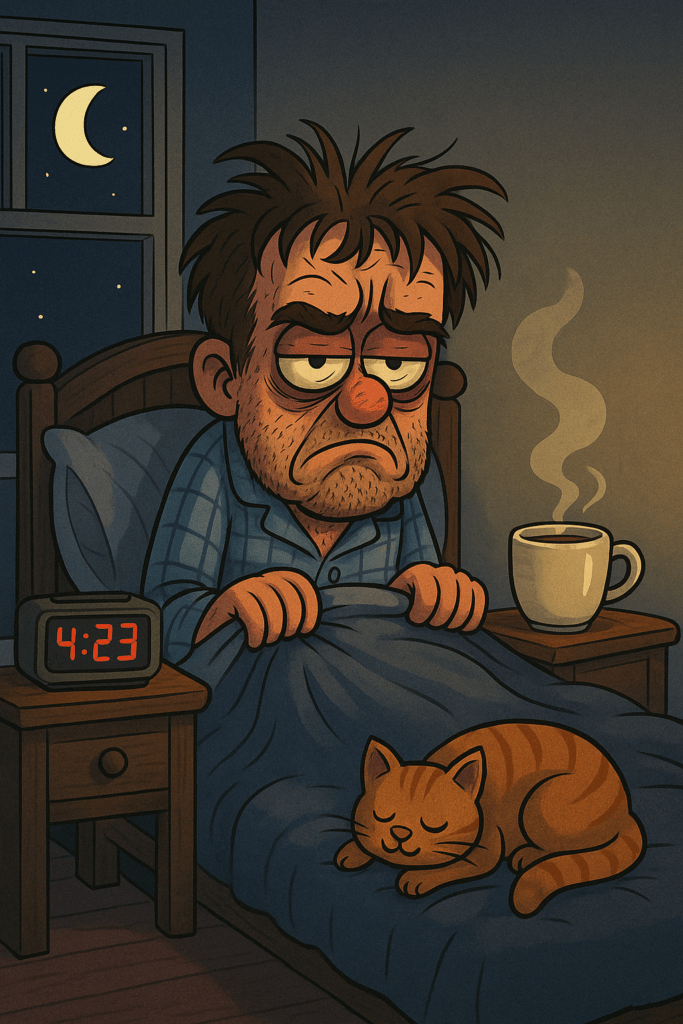
It was just after I sent my last newsletter about the book Don’t Believe Everything You Think that I received a beautiful reply from my good friend Mattias Hulting.
Mattias and I met while working together on a tough and highly complex ERP and HR project designed to integrate the former Wella business into P&G across Asia. It was one of those projects full of highs and lows, and I came to admire Mattias’ ability to keep things light while still being deeply thoughtful and sharp.
The note he sent, which shares a very interesting perspective on overthinking during the early morning hours, was so insightful I wanted to share it with you here unedited:
Hi Joerg,
Did you ever hear about the discrepancy between amygdala and prefrontal cortex alertness at night leading to a lot of anxiety and worry for people?
Hemingway wrote – in one of my favourite novels, The Sun Also Rises – “it’s easy to be hard boiled about things during the day, but at night it’s a different thing.” He said this about lying awake at night and letting things worry you that didn’t worry you during the daytime.
What he didn’t realise was that this has a very scientific reason. The amygdala, which detects threats, stays awake at night, continuing to neurotically worry about threats and trying to process emotions. But it doesn’t come up with any solutions – that’s the job of the prefrontal cortex, which requires sound sleep.
The prefrontal cortex not only comes up with solutions but also tempers and regulates emotions. But because it’s one of the busiest parts of the brain, it also takes the longest to wake up. So, when people say they can’t think because they haven’t had their coffee yet, they really have a point.
When the neurotic amygdala and the more confident, cool prefrontal cortex finally have their morning meeting, you reflect and think, “Why was I so worried about that in the middle of the night? It’s not that bad to begin with, and what’s more, I know how to deal with worst case scenarios.”
So, the best thing to do next time you wake in the middle of the night, in sweats, worrying about something that didn’t worry you at 3pm, just think, “It’s that damn amygdala acting up again, I’ll reason with him with Mr. Cortex in the morning.” Just knowing the chemical/scientific reason for what is happening will help you get back to sleep.
All the best from Fuji!
Mattias

I thought: WOW. What a beautiful insight, and how perfectly it connects with the previous newsletter about our negativity bias and the difference between Thoughts (those spontaneous ideas and insights) and Thinking (the active processing of them, which can often turn into overthinking).
Mattias’ message feels especially relevant now when so much in our world seems uncertain. Many of us wake up in the early hours, and once we’re awake, our thinking minds kick in and it can feel impossible to get back to sleep.
Pausing and reminding ourselves that it’s likely the amygdala running unchecked … and that we’ll handle the real world with much more skill when we are fully awake … can help ease that spiral. I also strongly believe that being kind to ourselves in those moments is even more important.
Because here’s the thing. Waking up in the early morning isn’t always a problem. Our body isn’t broken. It’s doing what it’s designed to do. In the early hours, our temperature drops, melatonin fades, and cortisol rises. It’s part of our natural circadian rhythm, gently nudging us into the day.
The challenge, of course, is what we do during those minutes … that can feel like hours.
Here are a few ideas that can support us:
- Don’t check the clock
- Keep your phone in airplane mode (and resist turning it on)
- Try the 4-7-8 breathing method (video)
- Do a “worry audit”. Write things down and ask, “Is this a problem to solve or a story I’m telling myself?”
- Jot down 3 things you’re grateful for
- Make a list of pleasant things
- Let yourself simply rest. Even calm breathing helps your body restore
- Listen to soft music or calming podcasts at a slower speed (my favourite)
- Gentle stretching or doodling
- Try visualisations or repeat simple phrases (even childhood poems)
- Use the military sleep method (video)
- If you’re wide awake after 20 minutes, get up and try something relaxing (reading, puzzle, warm shower)

If you find yourself awake in the early morning hours this week, try this:
Remind yourself of Mattias’ wise words: “This is just my amygdala doing its thing. I’ll let Mr. Cortex sort it out in the morning.”
Then, gently shift your focus to one of the small practices above.
You don’t need to fix everything at 4:23 a.m.
You just need to soften the moment, so your system finds its way back to rest.
Cheerio
Joerg
P.S. If you have a secret technique for getting back to sleep, I’d love to hear from you!

Leave a Reply